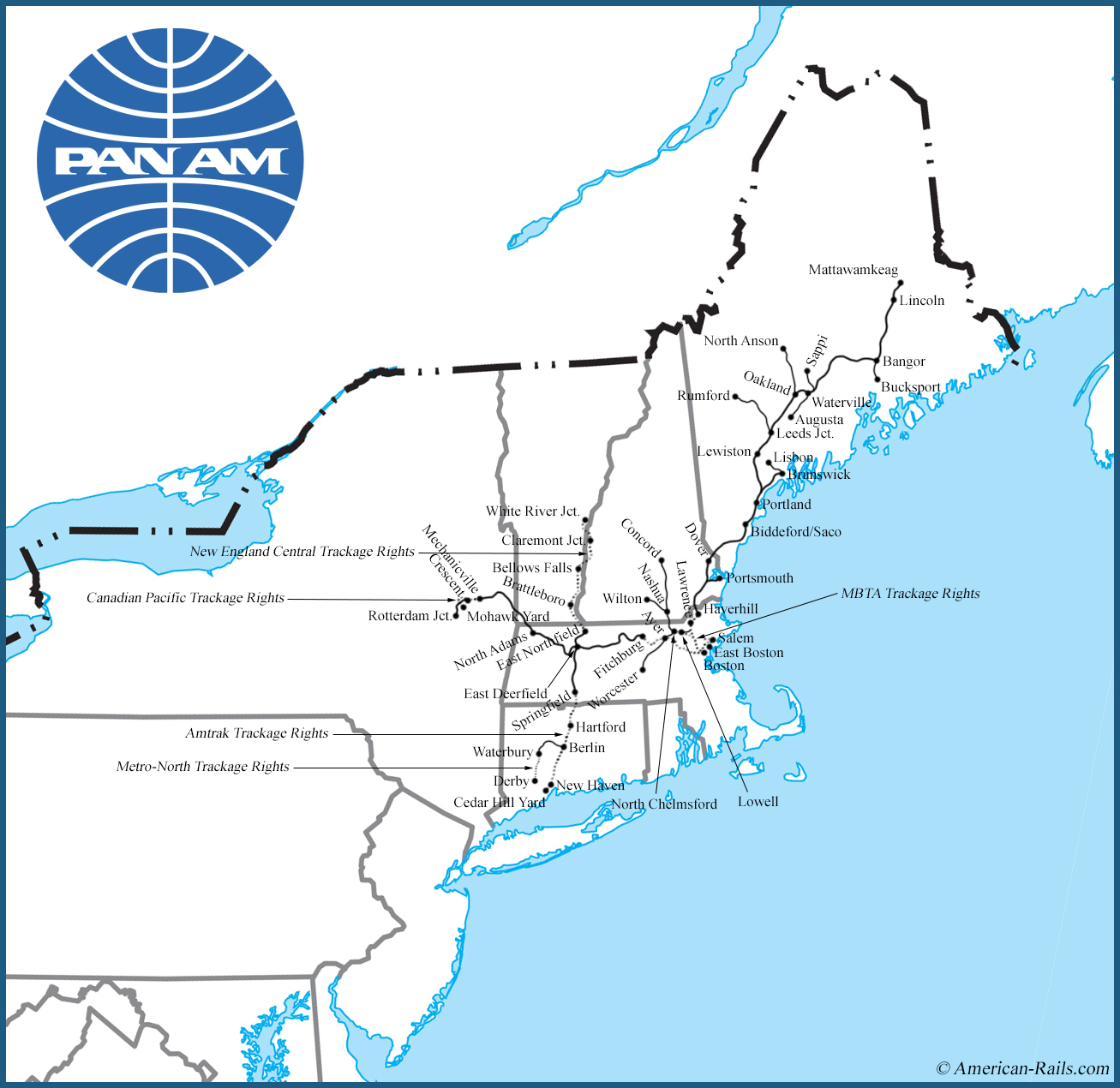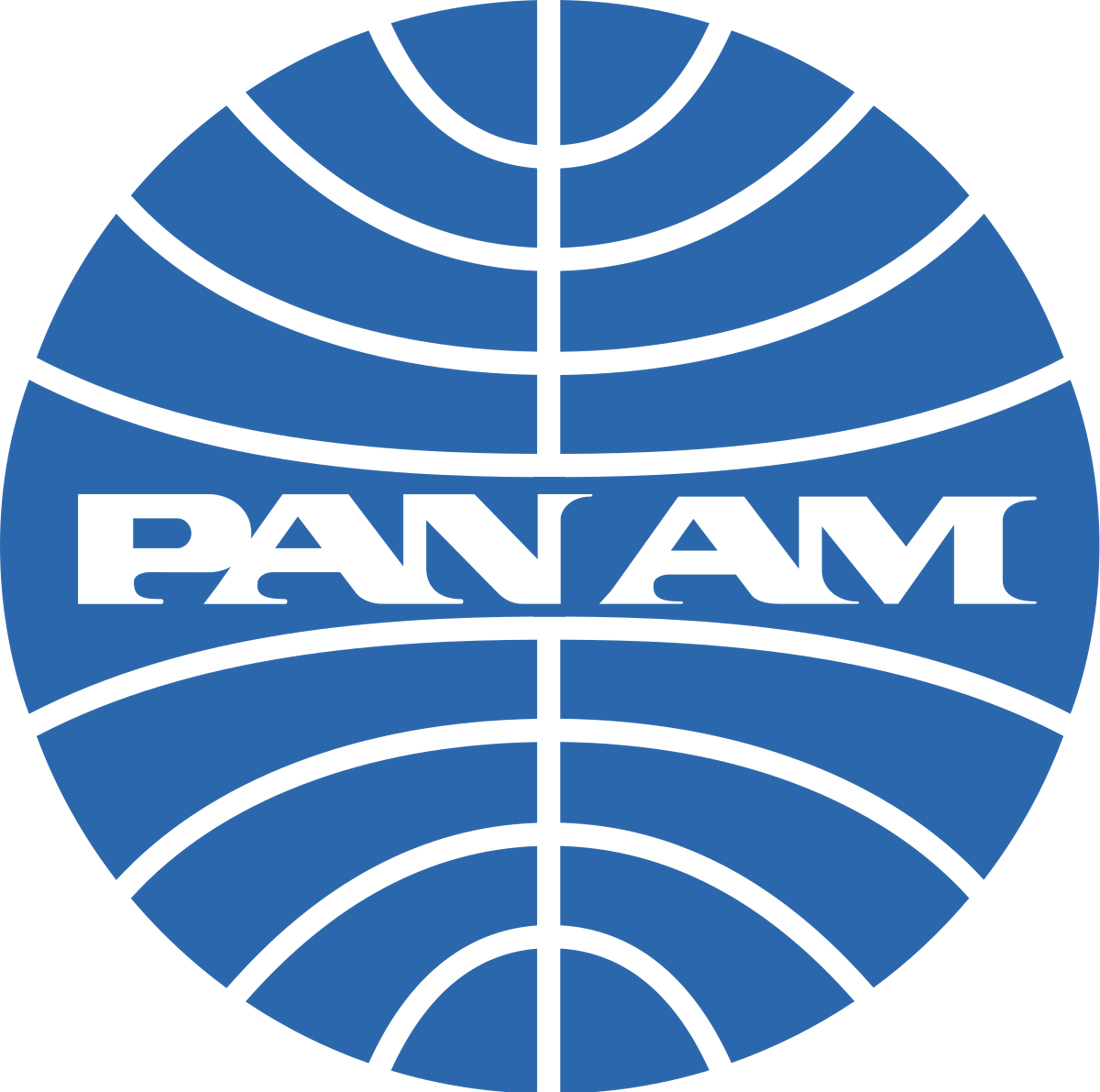Pan Am Railways: A Former New England Regional (2006-2022)
Last revised: August 30, 2024
By: Adam Burns
Pan Am Railways (reporting marks, PAR) was a relatively new Class II, regional railroad created in 2006. In 2022 it was fully acquired by CSX Transportation.
Its immediate predecessor is the Guilford Rail System that dates back to the early 1980s, formed as a holding company to oversee management of the railroads under its control (Boston & Maine, Maine Central, Portland Terminal, and the Springfield Terminal).
For railfans, it has been sad to witness those historic names disappear although technically many are still corporate entities (on paper only).
More succinctly, Guilford took draconian measures soon after its formation by selling or abandoning hundreds of miles of trackage.
A good deal of this infrastructure, such as Maine Central's Mountain Division and parts of the Boston & Maine network, would still be quite viable today.
Photos
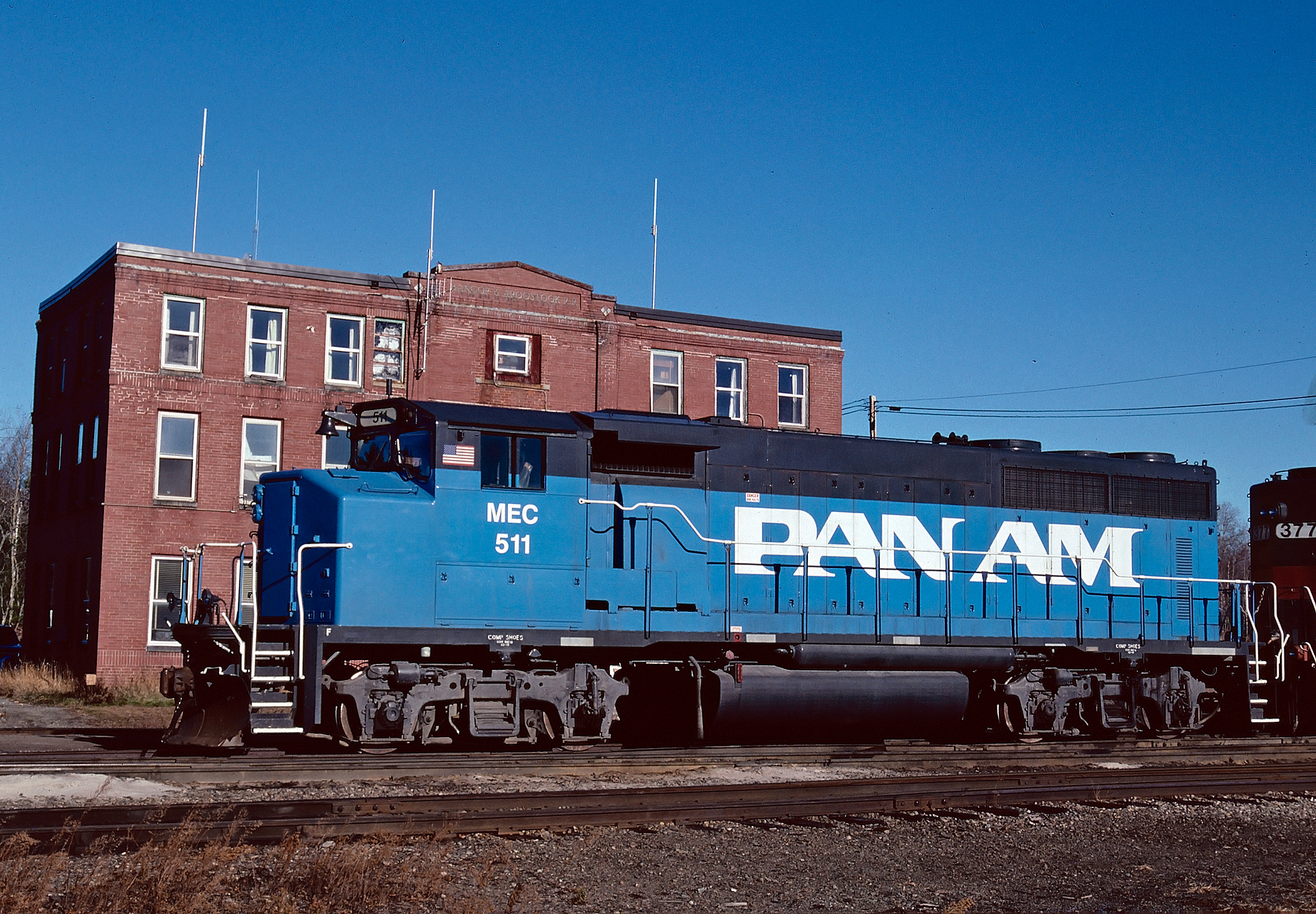 Pan Am Railway GP40-2LW #511 (sub-lettered for Maine Central) sits in front of the former Bangor & Aroostook station in Northern Maine Junction (Hermon), Maine on November 28, 2007. Under Pan Am/Guilford this building was a yard office. American-Rails.com collection.
Pan Am Railway GP40-2LW #511 (sub-lettered for Maine Central) sits in front of the former Bangor & Aroostook station in Northern Maine Junction (Hermon), Maine on November 28, 2007. Under Pan Am/Guilford this building was a yard office. American-Rails.com collection.For its part, Pan Am blossomed into a much more prominent company by partnering with major Class I's, like the Norfolk Southern, to provide high-quality rail service throughout the region.
This particular program was known as the Patriot Corridor, a high speed freight line designed to serve New England between Albany, New York and Boston.
During its time in service Pan Am blossomed into the nation's largest Class II carrier; it operated 1,800 route miles, employed 750, and was even large enough to host Amtrak trains. Trains Magazine broke news on June 29, 2020 that Pan Am was for sale.
Finally, on November 30, 2020 Railway Age announced that CSX Transportation had acquired the regional for $700 million, which became official in 2022.
History
To understand the history of the Pan Am system one needs to go way back to 1977.
That year the Guilford Transportation Industries (GTI) was formed by Timothy Mellon who was looking to enter the railroad business (the name reflects the owner's hometown of Guilford, Connecticut).
During the late 1970s the Maine Central was becoming a profitable operation once again.
However, it was sold to the U.S. Filter Corporation in late December, 1980 and literally days after that transaction occurred the new parent was sold to Ashland Oil, a company that had no desire or interest being in the railroad business.
With Mr. Mellon looking for a railroad to purchase he wasted no effort in grabbing the MEC with the sale completed by June of 1981.
To oversee the MEC he setup a holding company under GTI known as the Guilford Rail System with a new paint scheme of dark grey with an orange/red central stripe, and "Guilford Rail System" adorning the long hood sporting a large, stylized "G".
After the purchase of the MEC, Guilford picked up the fabled Delaware & Hudson later in 1981 from the Norfolk & Western-owned Dereco for just $500,000, formally completing the purchase in 1984.
The D&H, however, remained in Guilford ownership for just seven more years.
After declaring the company bankrupt in 1988 it sold the railroad to Canadian Pacific in 1991 for $25 million, which planned to use the route as a through main line between Montreal and New York (and continues to operate it today as a subsidiary).
In 1983, as the Boston & Maine was recovering from bankruptcy it too was purchased by Guilford for a little more than $24 million.
With this final transaction Guilford had a system that stretched throughout Maine, into New Hampshire, across Massachusetts, and also reached parts of Connecticut.
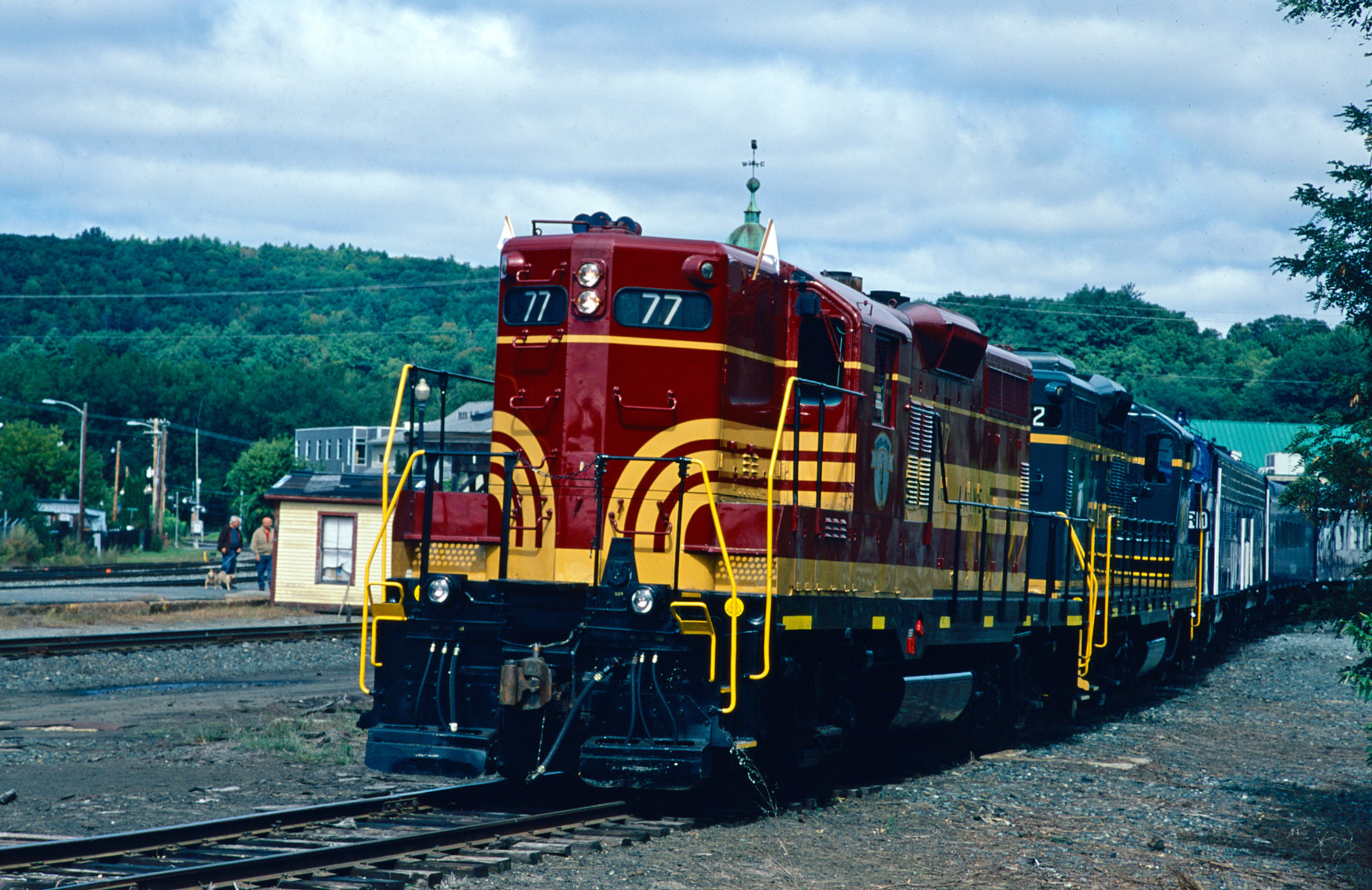 Boston & Maine GP9 #77 and Maine Central GP9 #52, heritage units belonging to Pan Am Railways, lead the company's business train at White River Junction, Vermont on September 14, 2014. Ben Martin photo. American-Rails.com collection.
Boston & Maine GP9 #77 and Maine Central GP9 #52, heritage units belonging to Pan Am Railways, lead the company's business train at White River Junction, Vermont on September 14, 2014. Ben Martin photo. American-Rails.com collection.The goal of in acquiring these roads was three-fold; to create a unified rail system in New England, compete against the region's then major (and only) Class I, Conrail ("Big Blue"), and provide economies of scale by doing such.
Soon after Guilford took control of these properties it began cutting back and abandoning routes considered superfluous or unprofitable such as several MEC lines in its home state and later virtually all of the original Springfield Terminal Railway, a line which had a long history as a classic electric interurban carrier.
Into the 1990s, Guilford remained much the same in terms of the routes it served and in 1998 it picked up the naming rights of the defunct Pan American World Airways, a once famous air line that had been out of business since 1991.
In 2006 Guilford changed its corporate name to reflect its purchase, even grabbing the old logo, and became known as Pan Am Railways.
From a management aspect not much has changed with the railroad but outwardly, gone is the "G" logo and old paint scheme (replaced with dark blue and white lettering) while still retaining the sub-lettering of independent lines Maine Central, Boston & Maine, and Springfield Terminal.
Despite the fact that under the Guilford name numerous miles of predecessor lines have been abandoned abandoned the railroad still retains a strong presence in New England.
Along with its own network, Pan Am today had trackage rights reaching New Haven, White River Junction (Vermont), Boston, northern Maine all of the way to border (towns such as Easton, Fort Fairfield, and Madawaska), and southern New Brunswick (Canada) at St. John and St. Stephen.
System Map
Additionally, as mentioned above, the new Patriot Corridor created in partnership with Norfolk Southern in 2008, opened high-valuable freight traffic between eastern New York, central Vermont, southern Connecticut, and eastern Massachusetts as part of the jointly owned Pan Am Southern Railway.
Targeted traffic on the route includes intermodal and automotive.
Aside from this traffic, traditional freight on the Pan Am included paper and timber products from Maine as well as some chemicals, bulk transfer stations, warehouse services, clay, and
other general merchandise.
Logo
While it has been disappointing from a railfan perspective to see the classic New England paint schemes of the D&H, Maine Central, and Boston & Maine disappear there is no doubting the economic benefits Pan Am had on the region.
Additionally, Pan Am became rather railfan friendly in the 2010s. In 2011 they debuted a GP9 in the original Boston & Maine "Minute Man" livery of dark maroon with gold pinstripes. They also released another GP9 in the Maine Central's classic green and yellow "Pine Tree Route" livery.
Locomotive Roster
| Builder | Model Type | Road Number | Notes/Disposition | Quantity |
|---|---|---|---|---|
| EMD | FP9 | 1-2 | Ex-CN | 2 |
| EMD | GP7/-R | 12, 15 | Springfield Terminal | 2 |
| EMD | GP9 | 45, 51, 52 (MEC heritage livery), 54, 62, 71-72, 77 (B&M heritage livery) | Springfield Terminal | 8 |
| EMD | GP35 | 201-210, 212, 214-215 | Springfield Terminal | 11 |
| EMD | GP40 | 300-321, 326-330, 332-335, 337, 340-342, 343-354, 370-371, 373-374, 376-382 | Maine Central/Boston & Maine | 58 |
| EMD | GP40-2LW | 500-508 | Maine Central, Ex-CN | 9 |
| EMD | GP40-2W | 509-519 | Maine Central, Ex-CN | 11 |
| EMD | SD40-2 | 600-620 | Maine Central, Ex-KCS, Ex-Trona | 21 |
| EMD | SD26 | 621, 643 | Springfield Terminal, Former SD24s | 2 |
| EMD | SD45 | 681 | Springfield Terminal | 1 |
| EMD | SD39 | 690 | Boston & Maine | 1 |
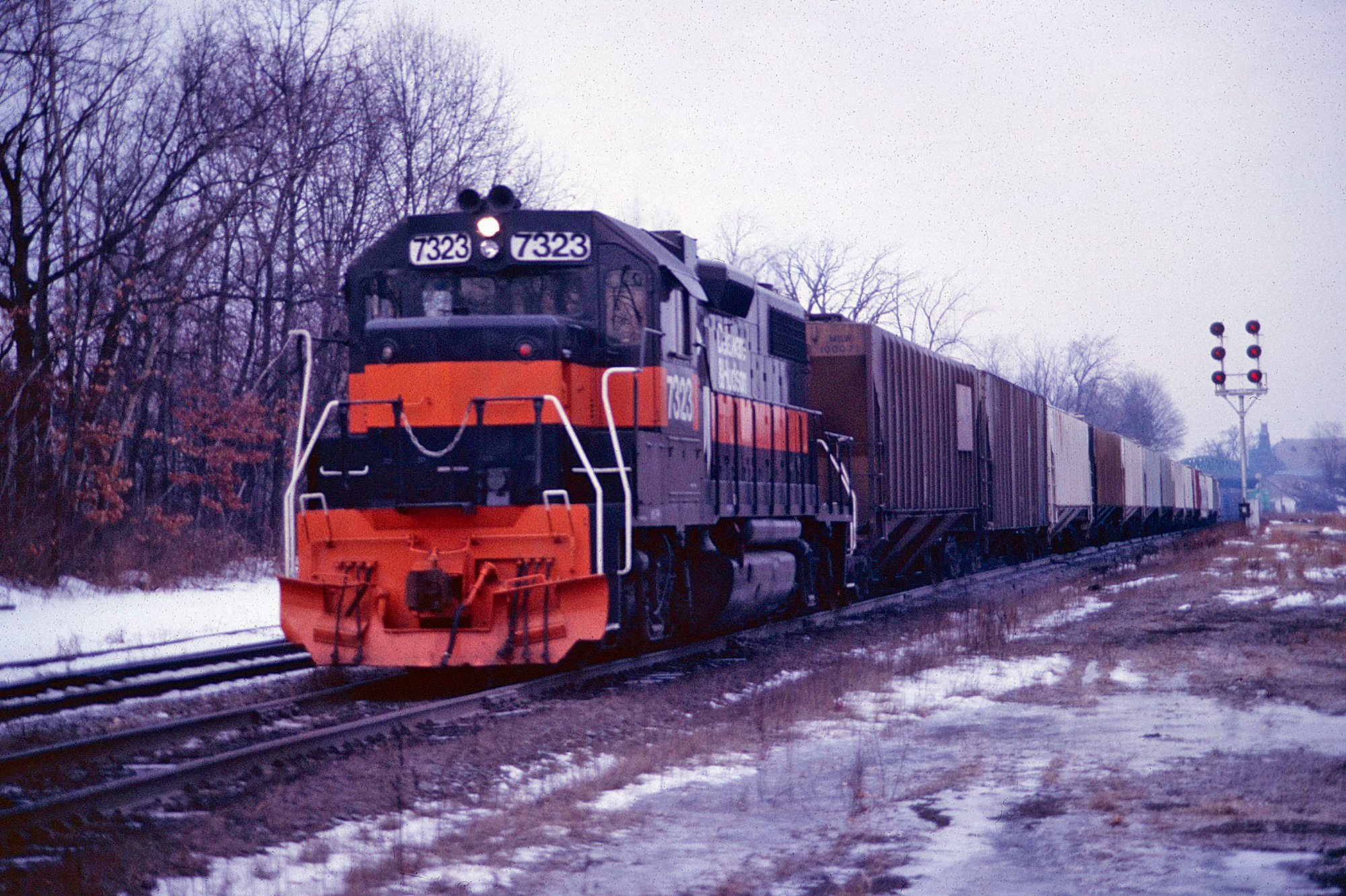 Delaware & Hudson GP38-2 #7323 (ex-Lehigh Valley #323) rolls through Ayers, Massachusetts over the Boston & Maine during the early Guilford era on February 1, 1988. American-Rails.com collection.
Delaware & Hudson GP38-2 #7323 (ex-Lehigh Valley #323) rolls through Ayers, Massachusetts over the Boston & Maine during the early Guilford era on February 1, 1988. American-Rails.com collection.CSX Sale (November 30, 2020)
It was announced back in June of 2020 that Pan Am Railway was for sale. It was believed at that time the only two Class I's potentially interested were Canadian National and Canadian Pacific while short line conglomerates Genesee & Wyoming, OmniTRAX, and Watco may also make bids.
Perhaps then it was somewhat surprising when CSX Transportation announced on November 30, 2020 it had acquired Pan Am for an estimated $700 million.
By adding 1,800 miles (1,200 true miles with the 600 mile Pan Am Southern Railway owned in conjunction with Norfolk Southern) to its 21,000-route mile network CSX will expand its reach in the states of Connecticut, New York and Massachusetts.
In addition, the Class I will open new markets in the states of Vermont, New Hampshire and Maine. According to CSX's statement:
"'The transaction will provide significant benefits to shippers and local communities as CSX integrates Pan Am into its best-in-class network.
In Pan Am, CSX gains a strong regional rail network in one of the most densely populated markets in the U.S., creating new efficiencies and market opportunities for customers as we continue to grow,' CSX President and CEO James M. Foote said. '
We intend to bring CSX’s customer-centric focus and industry-leading operating model to shippers and industries served by Pan Am.
We look forward to integrating Pan Am into CSX, with substantial benefits to the rail-served industries of the Northeast, and to working in partnership with connecting railroads to provide exceptional supply chain solutions to New England and beyond.'”
The Surface Transportation Board officially approved the takeover in April, 2022 and CSX officially took over operations on June 1, 2022.
In conjunction with this move, Genesee & Wyoming will operate a new subsidiary, the Berkshire & Eastern, which will continue on the former Pan Am Southern.
This operation had been a joint venture between Pan Am and Norfolk Southern that operated the ex-Boston & Maine west of Ayer, Massachusetts.
Recent Articles
-
KC Streetcar Ridership Surges With Opening of Main Street Extension
Feb 27, 26 11:24 AM
Kansas City’s investment in modern urban rail transit is already paying dividends, especially following the opening of the Main Street Extension. -
“Auburn Road Special” Excursions To Aid URHS
Feb 27, 26 09:04 AM
The United Railroad Historical Society of New Jersey (URHS) and the Finger Lakes Railway have jointly announced a special series of rare-mileage passenger excursions scheduled for April 18–19, 2026. -
New Jersey Easter Train Rides
Feb 27, 26 08:53 AM
New Jersey is home to several museums and a few heritage railroads that vividly illustrate its long history with the iron horse. A few host special events for the Easter holiday. -
Washington Easter Train Rides
Feb 27, 26 08:49 AM
You can find many heritage railroads in Washington State which illustrates its rich history with the iron horse. A few host Easter-themed events each spring. -
South Dakota Murder Mystery Dinner Train Rides
Feb 27, 26 08:46 AM
While the state currently does not offer any murder mystery dinner train rides, the popular 1880 Train at the Black Hills Central recently hosted these popular trips! -
Wisconsin Murder Mystery Dinner Train Rides
Feb 27, 26 08:42 AM
Whether you're a fan of mystery novels or simply relish a night of theatrical entertainment, Wisconsin's murder mystery dinner trains promise an unforgettable adventure. -
Pennsylvania Wine Tasting Train Rides
Feb 27, 26 08:38 AM
Wine tasting trains are a unique and enchanting way to explore the state’s burgeoning wine scene while enjoying a leisurely ride through picturesque landscapes. -
West Virginia Wine Tasting Train Rides
Feb 27, 26 08:37 AM
West Virginia, often celebrated for its breathtaking landscapes and rich history, offers visitors a unique way to explore its rolling hills and picturesque vineyards: wine tasting trains. -
Nebraska Lawmakers Advance UP Tax Incentive Bill
Feb 27, 26 08:31 AM
Nebraska lawmakers are advancing new economic development legislation designed in large part to ensure that Union Pacific Railroad maintains its historic corporate headquarters in Omaha. -
UP And NS Ask FRA To Waive Cab-Signals For Big Boy 4014
Feb 26, 26 01:44 PM
Union Pacific’s famed 4-8-8-4 “Big Boy” No. 4014 could see new eastern mileage on Norfolk Southern in 2026—but first, the two railroads are asking federal regulators for help bridging a technology gap… -
Cando Rail & Terminals to Acquire Savage Rail
Feb 26, 26 11:29 AM
Cando Rail & Terminals has signed a definitive agreement to acquire Savage Rail, the U.S. rail-services business of Savage Enterprises LLC. -
Dollywood To Convert Steam Locomotives From Coal To Oil
Feb 26, 26 09:20 AM
Dollywood’s most recognizable moving landmark—the Dollywood Express—will soon look and feel a little different. -
Missouri Murder Mystery Dinner Train Rides
Feb 26, 26 09:10 AM
Missouri, with its rich history and scenic landscapes, is home to one location hosting these unique excursion experiences. -
Washington Murder Mystery Dinner Train Rides
Feb 26, 26 09:08 AM
This article delves into what makes murder mystery dinner train rides in Washington State such a captivating experience. -
Utah Wine Tasting Train Rides
Feb 26, 26 09:04 AM
Utah, a state widely celebrated for its breathtaking natural beauty and dramatic landscapes, is also gaining recognition for an unexpected yet delightful experience: wine tasting trains. -
Vermont Wine Tasting Train Rides
Feb 26, 26 09:02 AM
Known for its stunning green mountains, charming small towns, and burgeoning wine industry, Vermont offers a unique experience that seamlessly blends all these elements: wine tasting train rides. -
Amtrak San Joaquins Becomes Gold Runner
Feb 26, 26 08:59 AM
California’s busy state-supported rail link between the Bay Area and the Central Valley entered a new chapter in early November 2025, when the familiar Amtrak San Joaquins name was officially retired. -
Canadian National Marks 30 Years Since Privatization
Feb 25, 26 02:07 PM
Canadian National Railway marked a milestone last fall that helped redefine not only the company, but the modern Canadian freight-rail landscape: 30 years since CN went private. -
Western Rail Coalition: Returning Passenger Trains To Colorado
Feb 25, 26 11:48 AM
Colorado’s passenger-rail conversation is often framed as two separate stories: a Front Range “spine” along I-25, and a harder, longer-term quest to offer real alternatives to the I-70 mountain drive. -
Union Pacific Unveils Full Schedule For Big Boy 4014
Feb 25, 26 09:24 AM
Union Pacific Railroad has released the complete western leg schedule for its groundbreaking 2026 Big Boy No. 4014 Coast-to-Coast Tour. -
Kentucky Murder Mystery Dinner Train Rides
Feb 25, 26 08:55 AM
In the realm of unique travel experiences, Kentucky offers an enchanting twist that entices both locals and tourists alike: murder mystery dinner train rides. -
Utah Murder Mystery Dinner Train Rides
Feb 25, 26 08:53 AM
This article highlights the murder mystery dinner trains currently avaliable in the state of Utah! -
Rhode Island Wine Tasting Train Rides
Feb 25, 26 08:50 AM
It may the smallest state but Rhode Island is home to a unique and upscale train excursion offering wide aboard their trips, the Newport & Narragansett Bay Railroad. -
Oregon Wine Tasting Train Rides
Feb 25, 26 08:45 AM
For those looking to explore this wine paradise in style and comfort, Oregon's wine tasting trains offer a unique and enjoyable way to experience the region's offerings. -
Amtrak Posts Record Ridership and Revenue in Fiscal Year 2025
Feb 24, 26 11:22 PM
Amtrak, the national passenger rail operator, has announced historic results for Fiscal Year 2025 (FY25), reporting the highest ridership and revenue in its history as demand for train travel across t… -
NC By Train Posts Busiest Month In 35-year History
Feb 24, 26 06:17 PM
North Carolina’s state-supported passenger rail service, marketed under the NC By Train brand, reached a milestone last fall. -
Northern Pacific 4-6-0 No. 1364 Returns To Life
Feb 24, 26 11:12 AM
The whistle of Northern Pacific steam returned to the Yakima Valley in a big way this month as Northern Pacific 4-6-0 No. 1364 moved under its own power for the first time in 73 years. -
CSX’s 2025 Santa Train: 83 Years of Holiday Cheer
Feb 24, 26 10:38 AM
On Saturday, November 22, 2025, CSX’s iconic Santa Train completed its 83rd annual run, again turning a working freight railroad into a rolling holiday tradition for communities across central Appalac… -
Alabama Murder Mystery Dinner Train Rides
Feb 24, 26 09:25 AM
There is currently one location in the state offering a murder mystery dinner experience, the Wales West Light Railway! -
Rhode Island Murder Mystery Dinner Train Rides
Feb 24, 26 09:21 AM
Let's dive into the enigmatic world of murder mystery dinner train rides in Rhode Island, where each journey promises excitement, laughter, and a challenge for your inner detective. -
Virginia Wine Tasting Train Rides
Feb 24, 26 09:20 AM
Wine tasting trains in Virginia provide just that—a unique experience that marries the romance of rail travel with the sensory delights of wine exploration. -
Tennessee Wine Tasting Train Rides
Feb 24, 26 09:17 AM
One of the most unique and enjoyable ways to savor the flavors of Tennessee’s vineyards is by train aboard the Tennessee Central Railway Museum. -
Southeast Wisconsin Eyes New Lakeshore Passenger Rail Link
Feb 23, 26 11:26 PM
Leaders in southeastern Wisconsin took a formal first step in December 2025 toward studying a new passenger-rail service that could connect Milwaukee, Racine, Kenosha, and Chicago. -
MBTA Sees Over 29 Million Trips in 2025
Feb 23, 26 11:14 PM
In a milestone year for regional public transit, the Massachusetts Bay Transportation Authority (MBTA) reported that its Commuter Rail network handled more than 29 million individual trips during 2025… -
Historic Blizzard Paralyzes the U.S. Northeast, Halts Rail Traffic
Feb 23, 26 05:10 PM
A powerful winter blizzard sweeping the northeastern United States on Monday, February 23, 2026, has brought transportation networks to a near standstill. -
Mt. Rainier Railroad Moves to Buy Tacoma’s Mountain Division
Feb 23, 26 02:27 PM
A long-idled rail corridor that threads through the foothills of Mount Rainier could soon have a new owner and operator. -
BNSF Activates PTC on Former Montana Rail Link Territory
Feb 23, 26 01:15 PM
BNSF Railway has fully implemented Positive Train Control (PTC) on what it now calls the Montana Rail Link (MRL) Subdivision. -
Cincinnati Scenic Railway To Acquire B&O GP30
Feb 23, 26 12:17 PM
The Cincinnati Scenic Railway, through an agreement with the Raritan Central Railway, to acquire former B&O GP30 #6923, currently lettered as RCRY #5. -
Texas Dinner Train Rides On The TSR
Feb 23, 26 11:54 AM
Today, TSR markets itself as a round-trip, four-hour, 25-mile journey between Palestine and Rusk—an easy day trip (or date-night centerpiece) with just the right amount of history baked in. -
Iowa Dinner Train Rides On The B&SV
Feb 23, 26 11:53 AM
If you’ve ever wished you could pair a leisurely rail journey with a proper sit-down meal—white tablecloths, big windows, and countryside rolling by—the Boone & Scenic Valley Railroad & Museum in Boon… -
North Carolina Wine Tasting Train Rides
Feb 23, 26 11:48 AM
A noteworthy way to explore North Carolina's beauty is by hopping aboard the Great Smoky Mountains Railroad and sipping fine wine! -
Nevada Wine Tasting Train Rides
Feb 23, 26 11:43 AM
While it may not be the first place that comes to mind when you think of wine, you can sip this delight by train in Nevada at the Nevada Northern Railway. -
Reading & Northern Surpasses 1M Tons Of Coal For 3rd Year
Feb 22, 26 11:57 PM
Reading & Northern Railroad (R&N), the largest privately owned railroad in Pennsylvania, has shipped more than one million tons of Anthracite coal for the third straight year. This was an impressive f… -
Minnesota's Northstar Commuter Rail Ends Service
Feb 22, 26 11:43 PM
Metro Transit has confirmed that Northstar service between downtown Minneapolis (Target Field Station) and Big Lake has ceased, with expanded bus service along the corridor beginning Jan. 5, 2026. -
Tri-Rail Sets New Ridership Record in 2025
Feb 22, 26 11:24 PM
South Florida’s commuter rail service Tri-Rail has achieved a new annual ridership milestone, carrying more than 4.5 million passengers in calendar year 2025. -
CSX Completes Major Upgrades at Willard Yard
Feb 22, 26 11:14 PM
In a significant boost to freight rail operations in the Midwest, CSX Transportation announced in January that it has finished a comprehensive series of infrastructure improvements at its Willard Yard… -
New Hampshire Wine Tasting Train Rides
Feb 22, 26 09:39 AM
This article details New Hampshire's most enchanting wine tasting trains, where every sip is paired with breathtaking views and a touch of adventure. -
New Jersey Wine Tasting Train Rides
Feb 22, 26 09:37 AM
If you're seeking a unique outing or a memorable way to celebrate a special occasion, wine tasting train rides in New Jersey offer an experience unlike any other. -
Nevada Murder Mystery Dinner Train Rides
Feb 22, 26 09:36 AM
Seamlessly blending the romance of train travel with the allure of a theatrical whodunit, these excursions promise suspense, delight, and an unforgettable journey through Nevada’s heart. -
West Virginia Murder Mystery Dinner Train Rides
Feb 22, 26 09:34 AM
For those looking to combine the allure of a train ride with an engaging whodunit, the murder mystery dinner trains offer a uniquely thrilling experience.

